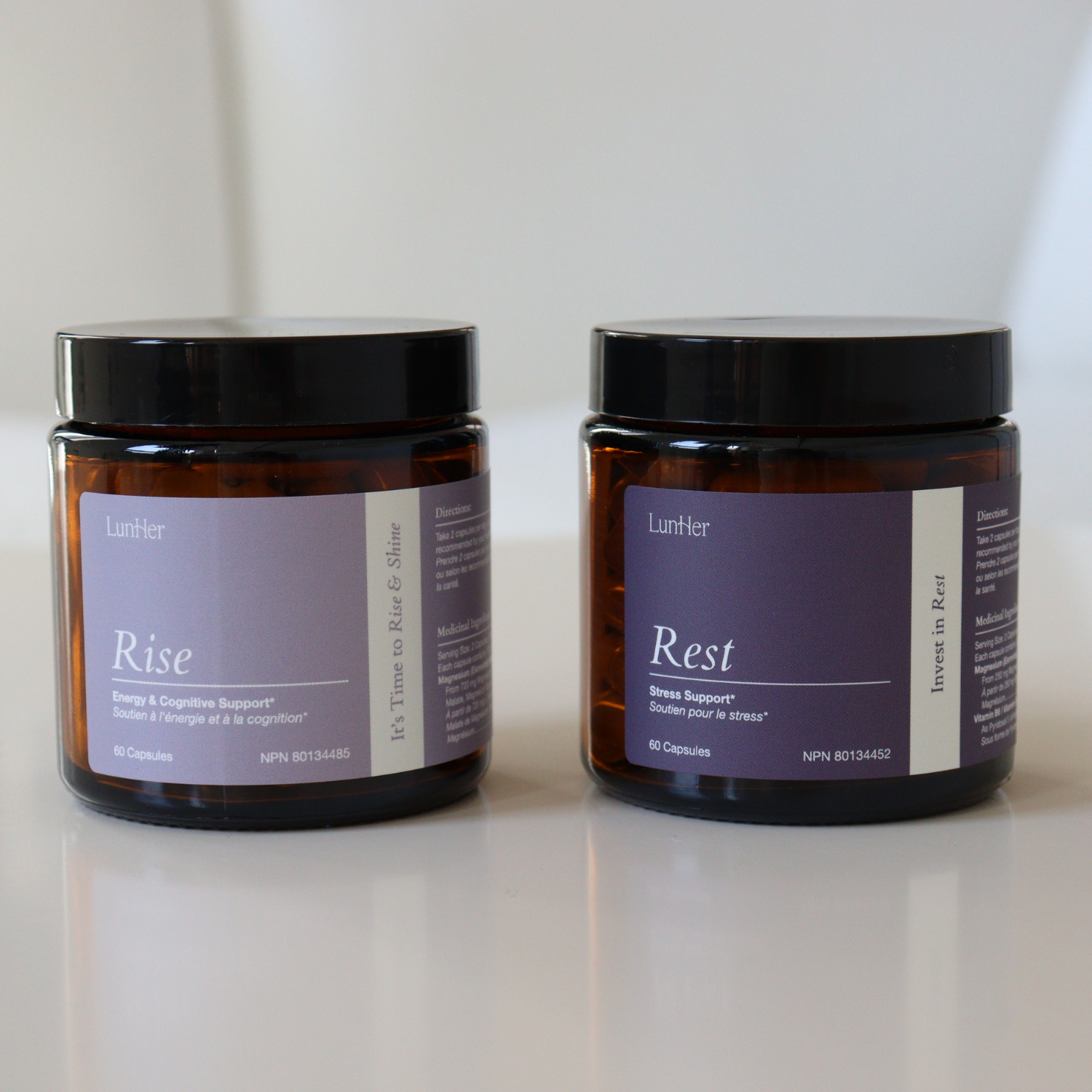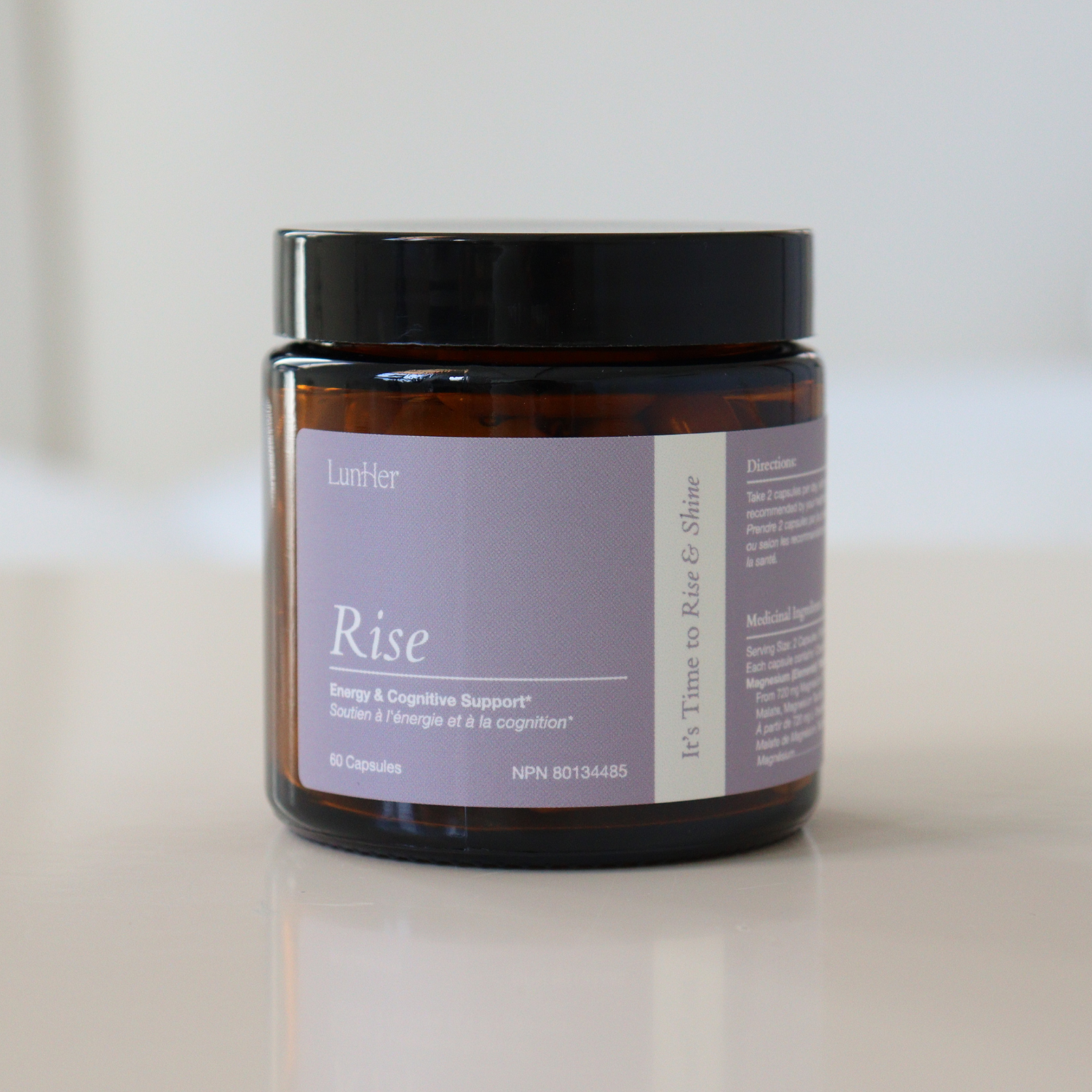
Should you take supplements? Unsure where to begin?
Are you interested in supplements but unsure about where to begin? You're not alone. It can be challenging to determine if you're receiving adequate vitamins, minerals and nutrients through your diet and routines. That's why we've gathered this simple guide to supplementation, with everything you need to know to get started.
The LunHer Take
We understand that navigating supplementation can be daunting, especially as our bodies and needs evolve.
Supplements are meant to supplement — priority should be nutrition and a well-balanced diet full of whole foods.
So what’s the answer? A combined approach. Taking a comprehensive multivitamin and supplements, while focusing on nutrient-dense diet, are critical for health & wellness — and to feel your best self.
What are Vitamins and Minerals?
Vitamins and minerals, collectively known as micronutrients, are the basic building blocks that our bodies need to perform daily functions effectively. These range from supporting growth, aiding digestion and ensuring proper nerve function.
There are 13 essential vitamins and 16 essential minerals, each with distinct functions and roles in the body's biological processes. Choline and carnitine were recently added as vitamin-like nutrients that the body needs. Vitamins can be categorized into fat-soluble and water-soluble – fat-soluble vitamins (A, D, E, and K) are stored in the body's fatty tissues and liver, while water-soluble vitamins (B-Complex and C) are not stored and must therefore be taken regularly.
Unlike vitamins, minerals are inorganic (does not contain a carbon atom). They can be categorized into macrominerals (needed in large amounts) and trace minerals (needed in small amounts).
Essential Vitamins and Minerals
Collectively, the essential vitamins and minerals comprise the micronutrients your body needs to function, develop, heal and grow properly.
Vitamin A: Helps with vision, improves the immune system, and promotes cell reproduction, as well as overall growth and development. This vitamin also helps the heart, lungs and other organs work properly.
Found in: fish, organ meats, dairy products such as milk and cheese, green leafy vegetables and other vegetables such as sweet potatoes, carrots, broccoli and squash. Is prevalent in some fruits including cantaloupe, mangos and apricots.
Vitamin C: Acts as an antioxidant and protects cells from damage. Vitamin C is required to make collagen and also helps strengthen the immune system. Finally, it is used to help the absorption of iron into the body.
Found in: Many fruits and vegetables, including oranges, grapefruit, strawberries, cantaloupe, broccoli, tomatoes and red or green peppers. Citrus juices are also a good source of Vitamin C.
Vitamin D: Vitamin D has many benefits that help good health. It helps the body absorb calcium, allows nerves to carry messages to your brain, and is required by your muscles to move. It also helps your immune system fight off bacteria and viruses.
Found in: milk and other dairy products like yogurt and cheese. Fatty fish, (which includes trout, salmon, and tuna) are some of the best sources. Additionally, it is added to many food products so be sure to check the labels.
Vitamin E: Vitamin E is very important to cells, it acts as an antioxidant by protecting cells from damage and cells use it to carry out important functions. Vitamin E also boosts the immune system to fight off bacteria and viruses. Another important function is that it widens blood vessels and keeps blood from clotting.
Found in: Vegetable oils (sunflower, wheat germ and safflower oils), nuts, and green vegetables. It is also added to breakfast cereals, juices, and margarine.
Vitamin K: Vitamin K is important for preventing blood clotting and keeping bones strong.
Found in: green leafy vegetables, vegetable oils, blueberries and figs. It can also be found in meat, cheese, eggs and soybeans.
Vitamin B1: Like lots of the vitamin B complex, vitamin B1, also known as Thiamin helps the growth, development and function of cells in your body.
Found in: whole grains and fortified bread, cereal, pasta and rice meat (especially pork), fish, legumes, seeds and nuts.
Vitamin B2: Vitamin B2 is also called Riboflavin and helps turn food into energy. It is also important for the growth, development, and function of cells in your body.
Found in: eggs, organ meats, lean meats and low-fat milk, mushrooms and spinach as well as fortified cereals, breads and grain products.
Vitamin B3: Vitamin B3 or niacin, is important for the development and function of cells in your body, and works to turn food into energy.
Found in: animal foods such as poultry, beef, pork, fish, nuts, legumes and grains.
Vitamin B5: Vitamin B5 helps to make and break down fats in the body and also turns food you eat into energy.
Found in: most vegetables, beef, poultry, seafood, eggs, milk, and whole grains.
Vitamin B6: Vitamin B6 helps the brain develop and is important during pregnancy and infancy. It also helps strengthen the immune system and is required for metabolism.
Found in: poultry, fish and organ meats, potatoes and starchy vegetables and fruit that is not citrus.
Vitamin B7: Vitamin B7 also known as biotin, works to turn carbs, fats and proteins into energy.
Found in: meat, fish, eggs and organ meats, seeds and nuts, along with some vegetables (sweet potatoes, spinach and broccoli).
Vitamin B9: Vitamin B9 or folic acid is required for cells to divide therefore is essential for making DNA and other genetic material.
Found in: beef liver, fruits, vegetables (especially asparagus, brussels sprouts, and dark leafy vegetables), nuts, beans and peas. It is added to pasta, rice, breakfast cereal and cornmeal.
Vitamin B12: Vitamin B12 helps keep the body's blood and nerve cells healthy. It prevents megaloblastic anemia (a blood condition that makes you tired and weak) and is used to make DNA.
Found in: fish, meat, poultry, eggs, milk and other dairy products. Some breakfast cereal is also fortified with B12.
Calcium: most abundant mineral in the body, needed to maintain strong bones and for nerves to carry out messages. Calcium helps release hormones and helps blood vessels move through the body.
Found in: dairy products, canned sardines and salmon, and certain vegetables such as kale, broccoli and bok choy.
Sodium: strongly tied to blood pressure and needed for muscle contractions and to help nerves function
Found in: salt, soy sauce, processed foods, and vegetables.
Potassium: helps maintain a steady heartbeat and send nerve impulses. It is needed for muscles to function and can help lower blood pressure.
Found in: meat, milk, fruits, vegetables, grains, and legumes.
Chloride: balances fluid in the body, it is a component of stomach acid and is essential in digestion.
Found in: salt, soy sauce, processed foods
Magnesium: important in regulating muscle and nerve function, blood sugar levels, and blood pressure. It is also used to make protein, bone, and DNA.
Found in: legumes, nuts, seeds, whole grains, and leafy vegetables. It has been added to fortified breakfast cereals and is also in milk, yogurt, and some other milk products.
Phosphorus: strengthens bones and teeth, helps convert food into energy and is part of DNA and RNA.
Found in: milk, meat, fruits, vegetables, grains, legumes
Iodine: required to make thyroid hormones which control the body’s metabolism. Thyroid hormones are required for bone and brain development during pregnancy and infancy.
Found in: seafood, dairy products and iodized salt.
Copper: helps the body make energy, maintains the nervous and immune systems, and activates genes. It is also required for brain development.
Found in: beef liver, shellfish, nuts, seeds, chocolate, and whole-grain products. Some vegetables such as mushrooms and avocados also have copper.
Manganese: used to make energy and protect your cells from damage. Your body needs manganese for strong bones, reproduction, and a healthy immune system.
Found in: whole grains, brown rice, oatmeal and whole-wheat bread, clams, oysters, mussels, nuts, legumes, leafy vegetables, some fruits, tea and spices.
Zinc: used to make DNA and helps the immune system fight off bacteria and viruses.
Found in: oysters, meat, fish, poultry, seafood, beans, nuts, whole grains, and dairy products.
Iron: used to make hemoglobin which is a protein in red blood cells that carries oxygen from the lungs to all parts of the body. Iron also makes myoglobin, a protein that provides oxygen to muscles.
Found in: lean meat, seafood, poultry, white beans, lentils, spinach and kidney beans. Some breakfast cereals and breads are iron-fortified where iron has been added to the flour.
Assess your dietary intake and determine gaps
Supplements are meant to supplement — priority should be nutrition and a well-balanced diet full of whole foods. But the reality is that many people struggle to meet their nutrient needs with diet alone, due to modern lifestyles, stress, diet, farming methods, soil depletion and so on…
So the critical first step is to identify potential gaps in our diet and determine if supplements would be beneficial. We can do this by:
- Maintaining a food diary: Keeping a detailed food diary involves recording everything you consume, including beverages, for 3-4 days. This method provides a snapshot of your eating habits and allows for an assessment of the types and quantities of foods you consume regularly. By weighing or estimating portions, you can identify any deficiencies or excesses in your nutrient intake. Food diaries can be maintained manually in a journal or electronically through food tracking apps, which often offer additional features like nutrient analysis and meal planning.
- Food-frequency questionnaires (FFQ): FFQs assess dietary intake over an extended period, usually several months to a year. These questionnaires ask about the frequency and portion sizes of specific foods and beverages consumed. FFQs are valuable for capturing long-term dietary patterns and identifying trends in nutrient intake. They are particularly useful in research settings and can provide insights into overall dietary quality and adherence to dietary guidelines.
- Professional Assessment: Seeking assessment from a general practitioner or naturopath offers a comprehensive evaluation of your nutritional status. Healthcare professionals may employ various tools and methods, such as physical examinations, blood tests, and biomarker analysis. Blood tests can measure levels of specific vitamins, minerals, and other nutrients in your bloodstream, helping to identify deficiencies or imbalances. Biomarkers, which are measurable indicators of biological processes like inflammation or nutrient metabolism, provide additional insights into your overall health and nutritional needs.
Ultimately, assessing your dietary intake can help you make informed decisions about your nutrition and overall health. By identifying potential gaps, you can take proactive steps to optimize your diet and lifestyle and, if necessary, incorporate the right supplements to help you feel your best.
Consider any unique lifestyle/health goals
Certain lifestyles or dietary choices can impact nutrient intake, therefore necessitating supplements. Let’s take a look at what these may be:
Athletes: Active individuals or athletes require more nutrients because of their energy expenditure. Protein is required to build and maintain muscle growth while B vitamins will be essential for energy production and metabolism. Additionally, magnesium and potassium will help with recovery and muscle function.
Pregnant women: Pregnancy demands a range of nutrients to support fetal development and maternal health. Key nutrients include folic acid, iron, calcium, vitamin D, Vitamin Bs, omega-3 and vitamin C.
Vegan, vegetarian, pescatarian: Diets low in meat may struggle to get enough vitamin B12, iron, zinc, calcium and omega-3. Careful planning and supplementation may be necessary to meet daily requirements.
Gluten-free: Individuals with gluten intolerance or celiac disease must find alternative sources of nutrients typically found in grains. This could be simply consuming gluten-free grains such as quinoa, as well as incorporating nutrient-dense foods such as legumes, fruits, vegetables, nuts and seeds to maintain a balanced diet.
Women with heavy periods: Heavy periods lead to iron loss over time, resulting in iron deficiency. Women experiencing heavy periods may require additional iron supplementation to replenish depleted iron stores and support healthy blood production.
Those over 55: Aging can impact nutrient absorption and metabolism, leading to deficiencies in key vitamins and minerals. Older adults may need extra vitamin D, vitamin B12 and calcium.
A Combined Approach
While a balanced diet should ideally provide most of the micronutrients we need, there are instances where supplementation becomes necessary. Supplements are designed to augment our daily intake of vitamins and minerals. This addresses any potential gaps or deficiencies that may arise due to dietary restrictions, lifestyle factors, or individual health conditions. Supplements come in various forms, including tablets, capsules, gummies, and gels, catering to different preferences and needs.
At LunHer, we take a comprehensive and personalized approach to vitamin and mineral supplementation. We understand that each individual is unique, with distinct nutritional needs and health goals. Our mission is to provide education and guidance to help you make informed decisions about your supplement regimen.
First and foremost, we emphasize the importance of understanding the functions of vitamins and minerals before incorporating them into your daily routine. This knowledge helps you tailor your intake to meet specific needs and avoid unnecessary or excessive consumption.
We believe that supplements are meant to complement a balanced diet and healthy lifestyle, not to replace them. While dietary choices play a fundamental role in meeting nutrient requirements, we recognize that busy lifestyles and dietary preferences can sometimes lead to nutritional gaps. Our solution is a combined approach where you prioritize a well-rounded diet while also considering a comprehensive multivitamin/mineral supplement to fill any potential gaps.
However, before starting any new supplement regimen, we strongly recommend consulting with a healthcare professional. They can provide personalized guidance based on your health status, medical history, and specific nutritional needs. This ensures that you are choosing the right supplements for your circumstances and avoiding any potential interactions or adverse effects.
Furthermore, we emphasize the importance of quality Loowhen selecting supplements. Not all supplements are created equal, and factors such as manufacturing processes, ingredient sourcing, formulation, and storage conditions can impact their effectiveness. We encourage you to look for high-quality products that have undergone testing to ensure they deliver nutrients effectively. Scientific evidence is also crucial in making informed decisions about supplements. Look for products that are backed by clinical trials, reviews, and analyses published in reputable scientific journals. Additionally, certifications from government agencies like Health Canada can assure product quality and safety.





